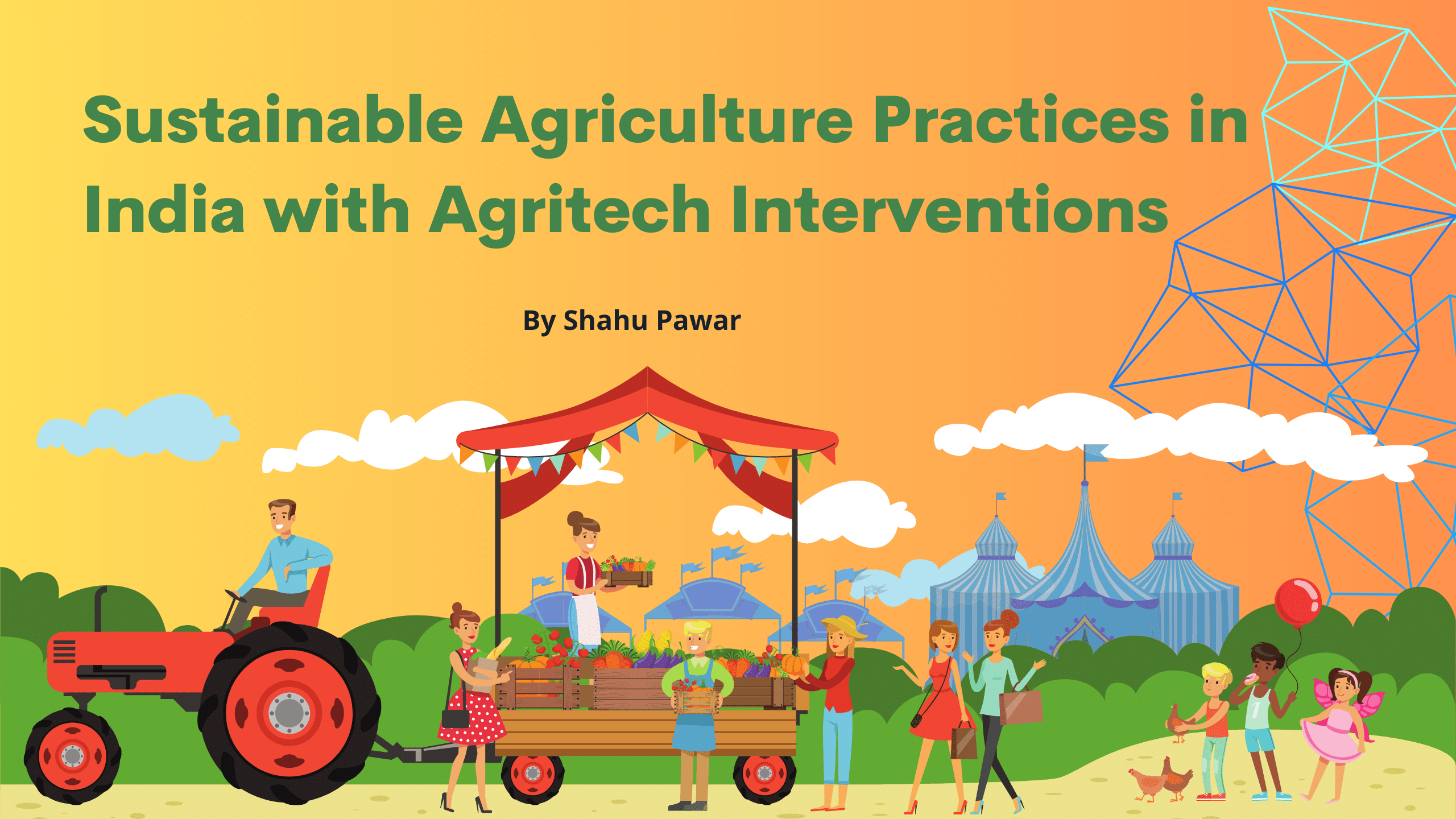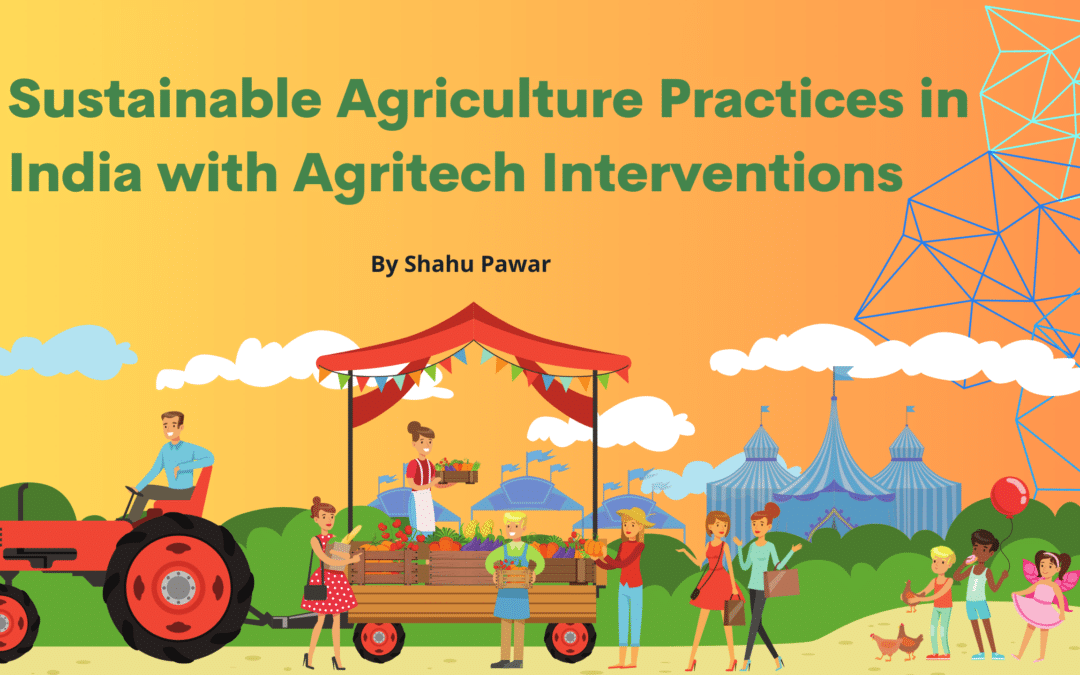Introduction:
Sustainable agriculture plays a vital role in ensuring food security, preserving the environment, and promoting rural development. With India’s growing population and increasing demand for food, it has become crucial to adopt innovative practices that enhance agricultural productivity while minimizing the negative impact on the ecosystem. In recent years, the integration of agricultural technology, commonly known as agritech, has emerged as a game-changer in promoting sustainable agriculture practices across the country. This blog explores the significance of sustainable agriculture practices in India and the role of agritech interventions in achieving this goal.

Sustainable Agriculture
Conservation Agriculture:
Conservation agriculture focuses on minimizing soil disturbance, preserving soil moisture, and enhancing soil health through the use of minimum tillage, crop residue management, and crop rotation. Agritech interventions such as precision planting equipment, sensor-based irrigation systems, and farm management software enable farmers to adopt conservation agriculture practices effectively. These technologies help conserve water, reduce soil erosion, and improve crop productivity.
Precision Farming:
Precision farming involves the use of technology to optimize crop inputs such as fertilizers, pesticides, and water. Agritech solutions like drones, satellite imagery, and sensor-based devices enable farmers to collect real-time data on soil moisture, nutrient levels, and pest infestations. This data-driven approach allows farmers to make informed decisions, minimize resource wastage, and maximize crop yield. Precision farming not only enhances productivity but also reduces the environmental impact associated with excessive chemical usage.
Vertical Farming and Hydroponics:
As urbanization continues to increase, the availability of arable land for traditional farming practices becomes limited. To address this challenge, vertical farming and hydroponics have gained traction in India. Vertical farming utilizes indoor spaces and vertical stacks to grow crops, while hydroponics eliminates the need for soil by using nutrient-rich water solutions. Agritech interventions in these practices include LED lighting systems, automated nutrient supply, and climate control mechanisms. By minimizing land usage, conserving water, and reducing transportation costs, vertical farming and hydroponics offer sustainable alternatives for urban agriculture.
Climate-smart Agriculture:
Climate change poses significant challenges to agriculture, including unpredictable weather patterns, water scarcity, and increased pest and disease outbreaks. Agritech interventions play a crucial role in enabling farmers to adapt to these challenges through climate-smart agriculture practices. Weather forecasting systems, smart irrigation technologies, and pest monitoring tools help farmers make climate-informed decisions. By promoting resource efficiency and resilience, climate-smart agriculture contributes to sustainable food production in the face of climate uncertainties.
Soil Health Monitoring and Management:
Agritech interventions enable farmers to monitor and manage soil health effectively. Soil sensors and IoT devices provide real-time data on soil moisture, pH levels, nutrient content, and organic matter. This information helps farmers make informed decisions about nutrient management, irrigation scheduling, and organic soil amendments. By optimizing soil health, agritech interventions contribute to enhanced crop productivity, reduced fertilizer use, and minimized nutrient runoff.
Integrated Pest Management (IPM):
Agritech interventions support the implementation of Integrated Pest Management practices in Indian agriculture. IoT devices and sensors enable real-time monitoring of pest populations, weather conditions, and crop health indicators. This data aids in early pest detection, enabling farmers to employ targeted interventions such as biopesticides, pheromone traps, or beneficial insects. By minimizing reliance on chemical pesticides, agritech-driven IPM practices promote ecological balance, protect beneficial organisms, and reduce environmental pollution.
Crop Monitoring and Yield Prediction:
Agritech solutions assist in crop monitoring and yield prediction, facilitating efficient resource allocation and decision making. Satellite imagery, drones, and remote sensing technologies provide valuable insights into crop health, growth patterns, and yield potential. By analyzing this data, farmers can optimize fertilizer application, adjust planting densities, and manage crop rotations effectively. Accurate yield predictions enable farmers to plan harvesting, storage, and market strategies, reducing post-harvest losses and improving overall productivity.
Organic Farming and Sustainable Inputs:
Agritech interventions support the adoption of organic farming practices and the use of sustainable inputs. Online platforms and mobile applications provide farmers with access to organic certification information, organic farming techniques, and marketplaces for organic produce. Moreover, IoT devices and sensors assist in monitoring and maintaining optimal conditions for organic farming, such as composting, biofertilizer application, and crop rotation. By promoting organic farming, agritech interventions contribute to soil health improvement, biodiversity conservation, and the production of healthier, chemical-free food.
Farmer Education and Knowledge Sharing:
Agritech solutions facilitate farmer education and knowledge sharing on sustainable agriculture practices. Mobile applications, e-learning platforms, and online communities provide farmers with access to information, expert advice, and best practices. These platforms enable farmers to learn about sustainable farming techniques, exchange experiences, and stay updated on the latest advancements in agriculture. By empowering farmers with knowledge, agritech interventions play a vital role in promoting sustainable agriculture adoption across India.
Conclusion:
Sustainable agriculture practices are essential for the long-term prosperity of India’s agricultural sector and the well-being of its population. Agritech interventions offer innovative solutions to address the environmental and productivity challenges faced by farmers. By adopting practices such as conservation agriculture, precision farming, vertical farming, and climate-smart agriculture, farmers can enhance productivity, conserve resources, and mitigate the adverse effects of climate change. It is crucial for policymakers, agricultural organizations, and technology providers to collaborate and promote the widespread adoption of sustainable agriculture practices supported by agritech interventions. Together, we can build a resilient and sustainable future for Indian agriculture.
Note: Agritech interventions mentioned in this blog are indicative and not exhaustive, as technological advancements continue to contribute to sustainable agriculture practices.

